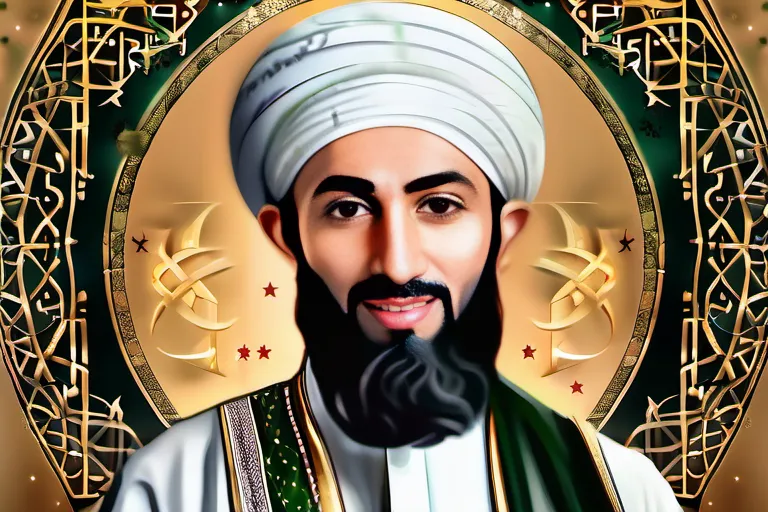Discover the life, teachings, and impact of Islam’s most revered prophet.
Explore the remarkable life of Prophet Muhammad, a man who transformed the Arabian Peninsula and founded one of the world’s great religions. From his humble beginnings to his role as a unifier and visionary leader, learn about the man behind Islam’s rapid rise.
Early Life and Revelation
Imagine stepping back in time to the bustling streets and marketplaces of Mecca, where life revolved around the worship of multiple deities, each represented by idols in the Kaaba. In this intricate web of beliefs, there emerged a child who would later come to be known as the Prophet Muhammad. His name, Muhammad, which means ‘the praised one,’ encapsulates the honor and respect that he would earn.
Born in 570 CE into the Quraysh tribe, his lineage traced back to the respected Banu Hashim clan. Muhammad’s birthplace, Mecca, was a city of great significance due to its status as a holy site for trade caravans and pilgrims. Yet, despite the city’s wealth, Muhammad’s early years were marked by tragedy; he lost both parents at an early age, leading him into the care of his grandfather Abd al-Muttalib and later his uncle Abu Talib.
As a young man, Muhammad accompanied caravans to Syria where he gained notoriety for his honesty and trustworthiness. It was during these journeys that he encountered ideas beyond the familiar polytheistic traditions, broadening his horizons. His uncle Abu Talib took him under his wing when he returned home, but it would be a significant event in his early life that would change everything.
One night, Muhammad had a series of profound revelations. According to tradition, an angel named Gabriel visited him and recited the first verses of what would become the Quran. At first, Muhammad was bewildered by these experiences; he questioned himself: “Could this be real? Am I speaking with an angel?” These revelations marked the beginning of his prophetic mission, a journey that would challenge the very foundations of life in Mecca.
The early events leading up to the revelation laid the groundwork for what was to come. They introduced Muhammad to themes of monotheism, justice, and compassion—principles that would shape the Islamic faith. These experiences were transformative, setting the stage for a life dedicated to spreading these teachings amidst great adversity.
Prophet Muhammad’s Teachings
Imagine standing at the edge of a vast sea, where every wave symbolizes the core teachings and principles revealed by Prophet Muhammad. Just as each drop of water merges into the ocean, so too do these teachings blend to form the fabric of Islam. Let’s delve deeper into the heart of this spiritual journey.
The Five Pillars of Islam stand like majestic pillars holding up a grand dome of faith. They are the cornerstones upon which every Muslim’s life is built. The first pillar, Shahada, or the declaration of faith, is akin to planting a seed in fertile soil—once planted, it sprouts and grows into a tree of belief. Next comes Salat, prayer, which is like daily nourishment for this growing tree, keeping its branches strong and leaves green.
Charity (Zakat) is another pillar that ensures the soil remains rich. Just as plants need nutrients to thrive, so do people who give of their wealth to help those in need. Fasting during Ramadan is a metaphorical cleanse, purifying both body and soul through self-restraint. Lastly, Hajj, pilgrimage to Mecca, serves as a unifying force, bringing people from all walks of life together under the same sky.
Monotheism, or the belief in one God (Allah), is like a single thread that ties this entire fabric together. It’s not just about acknowledging the existence of a deity; it’s about understanding and experiencing the profound unity and interconnectedness within creation. This concept permeates every aspect of life, from personal conduct to community interactions.
The teachings of Prophet Muhammad emphasize kindness, mercy, and compassion. These virtues are like gentle rains that nourish the earth, ensuring it remains fertile and productive. In a world often torn by conflict and division, these principles offer a beacon of hope—a reminder that humanity is strengthened through unity and understanding.
The Life of a Leader
Imagine a leader whose life was woven through the threads of battles, treaties, and political alliances—Prophet Muhammad exemplified leadership that transcended military prowess. His journey from a humble merchant to the head of a state transformed not just his people but the world’s understanding of governance and peace.
Battles were more than mere confrontations; they were tests of righteousness. The Battle of Badr, for instance, was a pivotal moment where Prophet Muhammad led his small band of followers against a larger, better-equipped army. This fight symbolized the struggle between truth and falsehood, with Prophet Muhammad emphasizing the importance of unity and moral strength.
Treaties too were significant in shaping the future. The Al-Hudaybiyyah Treaty, signed during the early years of Islam, was a masterful example of diplomacy. It allowed for temporary peace and mutual respect, demonstrating Prophet Muhammad’s wisdom in navigating complex political landscapes.
Political alliances were forged not just through shared interests but through the unifying power of faith. As Islam spread, it attracted followers who joined the nascent Muslim community. These alliances strengthened the state both internally and externally, paving the way for a unified front against external threats.
Prophet Muhammad’s leadership was marked by his ability to balance military necessity with ethical considerations. His strategic decisions were guided by principles of justice and compassion, which often led him to avoid unnecessary conflict when possible. The Battle of Uhud, though initially disastrous, taught valuable lessons about preparation and perseverance—lessons that echo through the annals of history.
As we delve into these events, it becomes clear that Prophet Muhammad’s leadership was not just about conquest but about building a society founded on righteousness, justice, and peace. His life story is a testament to how leadership can bring about profound societal change through the integration of faith with governance.
Prophet Muhammad’s Impact on Society
Imagine a world where society, culture, and economy were intertwined like a delicate web—this was the Arabia that Prophet Muhammad transformed. How did his teachings shape this landscape? The answer lies in understanding the profound impact of his leadership on both local and global scales.
In A.D. 622, when Muhammad migrated to Medina, he brought with him not just a message but a blueprint for societal change. His vision was clear: to create a society where every individual’s rights were respected, regardless of their background or status. This concept was revolutionary; it’s as if he was planting seeds of unity in the midst of a desert of tribal division.
One cannot discuss the social impact without mentioning the Ummah, the community that Muhammad fostered. It wasn’t just about religious devotion but also about creating an inclusive society where every person had a role to play. This idea was encapsulated in his famous saying, ‘The best among you is he who learns the Qur’an and teaches it.’ In this way, knowledge became a tool for social upliftment.
But how did these ideas translate into practical reforms? Consider the economic sphere. Muhammad introduced principles that aimed at fair trade and charity, ensuring that wealth was distributed justly. Imagine a market where every vendor was honest, and every buyer felt secure—this was his vision for commerce. His teachings on Sadaqah (charity) transformed not just individuals but entire communities into a network of support.
The cultural aspect cannot be overlooked either. Through poetry and literature, Muhammad encouraged the preservation of Arabic heritage while promoting values that transcended tribal affiliations. This was akin to weaving a tapestry with threads from different backgrounds, creating something new yet rich in tradition.
As for the political dimension, his leadership was marked by treaties such as the Treaty of Hudaybiyyah, which brought about peace and stability. It’s like he was navigating through a stormy sea, steering it towards calmer waters, ensuring that the ship of society moved forward without capsizing.
Prophet Muhammad’s teachings were not just words but actions that set the stage for change. He proved that social, cultural, and economic transformations could coexist harmoniously under one banner—his own. This legacy continues to inspire societies around the world, reminding us that the true strength of any community lies in its ability to unite and grow together.
The Legacy of Prophet Muhammad
When we delve into the legacy of Prophet Muhammad, it becomes clear that his impact extends far beyond the confines of time and space. Just as a lighthouse guides ships through treacherous waters, his teachings illuminate the path for billions around the world today. How did his contributions shape not only religious practices but also literature, law, and architecture?
Consider the literary works that have emerged under the shadow of his guidance. The Koran, or Quran, stands as a monumental text, with its verses inspiring poets, writers, and scholars across generations. Its timeless wisdom has been translated into countless languages, ensuring that its messages remain relevant to diverse cultures and contexts. Can we imagine the literary world without the profound influence of these sacred words?
In terms of law, Prophet Muhammad laid down principles that have guided Islamic jurisprudence for centuries. His teachings on justice, compassion, and fairness continue to inform legal systems in many Muslim-majority countries today. How do his ethical guidelines compare with contemporary legal standards? Is there a way we can integrate these ancient values into modern legal frameworks?
Architecture, too, bears the imprint of his legacy. Mosques around the world often reflect architectural styles that trace back to his time and those of early Muslims. The grandeur and simplicity of these structures serve as physical manifestations of Islamic artistry and devotion. Can you think of any famous mosques that embody his principles? How do their designs speak to the core values he espoused?
From literature to law, and from architecture to ethics, Prophet Muhammad’s influence is pervasive. His teachings continue to shape contemporary Islam in profound ways, offering a roadmap for spiritual growth, social justice, and moral integrity. As we explore his legacy further, we find that the questions he raised centuries ago still resonate deeply in our lives today.
In conclusion, his impact is not merely historical; it is profoundly ongoing. Through his wisdom and guidance, Muslims continue to navigate the complexities of their faith and daily lives, drawing strength from the lessons imparted by this revered prophet.
Prophet Muhammad’s Character and Virtues
Who is Prophet Muhammad? Beyond just a name, he is often seen as a towering figure in history, embodying virtues that continue to inspire millions. Can we truly grasp the essence of his character and virtues? Let’s dive into what made him a role model for Muslims worldwide.
Imagine walking through the bustling streets of Madinah, where one man is revered not just as a prophet but as a paragon of honesty, compassion, and humility. How did these qualities shape his life?
Honesty was more than just a virtue; it was part of his very being. When dealing with the trade caravans in Makah, he earned such a reputation for integrity that even those who disagreed with him trusted him with their business. How many of us can claim to be as trusted and honest in our daily dealings?
Compassion was evident in his interactions, especially towards the weak and marginalized. When visiting the sick or comforting the distressed, he was always there with a gentle word and a helping hand. How often do we see such genuine compassion in the world today? Could we emulate this in our own lives, showing mercy to those less fortunate?
Humility was another hallmark of his character. He never sought greatness for himself but always stressed the need for humans to submit to Allah. Even as a leader and guide, he maintained an attitude of submission, reminding us that no one is above God’s will. How many leaders today can match this level of humility?
These virtues didn’t just exist in isolation; they were intertwined and complemented each other. His honesty laid the foundation for trust, his compassion guided him to care for others, and his humility kept him grounded in a world that often sought greatness.
Through his character, Prophet Muhammad teaches us not only about divine guidance but also about being better human beings. As we navigate our own lives, can we strive to embody these qualities? The legacy of Muhammad goes beyond his time; it resonates in the hearts and actions of those who follow him.
Reflect on your own life: how can you incorporate honesty, compassion, and humility into your daily interactions? These virtues are not just for Muslims but for all humanity to strive towards. After all, the journey of self-improvement begins with acknowledging these simple yet profound truths.
Conclusion
 Understand the profound influence Prophet Muhammad has had on millions across the globe and explore how his teachings continue to shape contemporary society.
Understand the profound influence Prophet Muhammad has had on millions across the globe and explore how his teachings continue to shape contemporary society.











